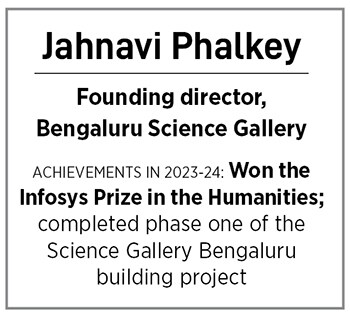Jahnavi Phalkey: The scientific storyteller
Jahnavi Phalkey harnesses a historian's discipline and a storyteller's craft to make science accessible to everyone—as it should be


Asking the right questions has always been important to Jahnavi Phalkey. In fact, the realisation, early on in her research work, that the questions she was asking were not the ones she was seeking, led her to change the direction of her career.
This took her to the Georgia Institute of Technology, US, where she immersed herself in the history of science and technology of contemporary India. “To date, I remain completely fascinated with it," she says. “Especially if you’re working on India, it’s a massively open field, we don’t have a critical mass of scholars working on recent and contemporary history of science in India."
Her work started as an accident, she says, because the Georgia Tech full scholarship came first, but there was also a fire within, almost akin to anger that drove her to seek answers.
For example, science from India in the first half of the 20th century included a Nobel Prize win, prestigious nominations and so on, and yet, the accepted narrative seemed to be that, in telling the story of science in the world, if India were removed, it wouldn’t really matter. Such thought processes were “problematic", she says. And she wanted to address them.
Earlier this year, the Infosys Science Foundation recognised Phalkey with the Infosys Prize in the Humanities category for showing how “science is not done in isolation", as she’s said herself, but in the messy environment of humanity, society, politics, power and personal ambition.
 “Her brilliant anthropology of science has emphasised the need to see the history of science as much as a history of scientific ideas, as one of power, practice and the nation-state," the Infosys Science Foundation notes.
“Her brilliant anthropology of science has emphasised the need to see the history of science as much as a history of scientific ideas, as one of power, practice and the nation-state," the Infosys Science Foundation notes.
Her major work is the highly regarded book, Atomic State: Big Science in Twentieth Century India Science, History, and Modern India, published in 2013. She is also the co-editor of Key Concepts in Modern Indian Studies, which was published in 2015.
Her documentary film Cyclotron, released in 2020, tells the story of the longest-running particle accelerator in India and the scientists behind it. “I became fascinated with trying to tell stories through objects and scientific instruments," Phalkey recalls.
Phalkey has held several academic positions, and is currently the founding director of the Bengaluru Science Gallery, part of an international network of science galleries that originated in Dublin, Ireland.
Click here for W-Power List 2024
At a time when India is playing catch up in science and tech on multiple fronts, the role of a science historian affords one the opportunity to look at why and how we got to be where we are in a dispassionate manner, Phalkey says, “with the least amount of preconceived assumptions".
This is not to be confused with individual scientists being less respected. By and large, they are recognised for their contributions today.
At the science gallery, Phalkey wants to create a welcoming space for young people to “just hang out", away from the absurdly competitive world outside, and be fascinated with whatever catches their curiosity—be it science or arts. She sees it as contributing to raising a generation of open and inventive minds across disciplines in India. And if it comes across as “a ridiculously grand idea", she’s okay with that, because she’s aware of the scale and difficulty involved as a “deep pessimist", but who refuses to be cynical.
First Published: Mar 19, 2024, 13:09
Subscribe Now